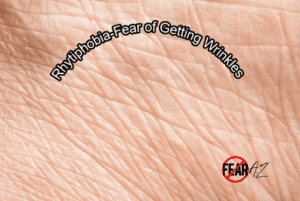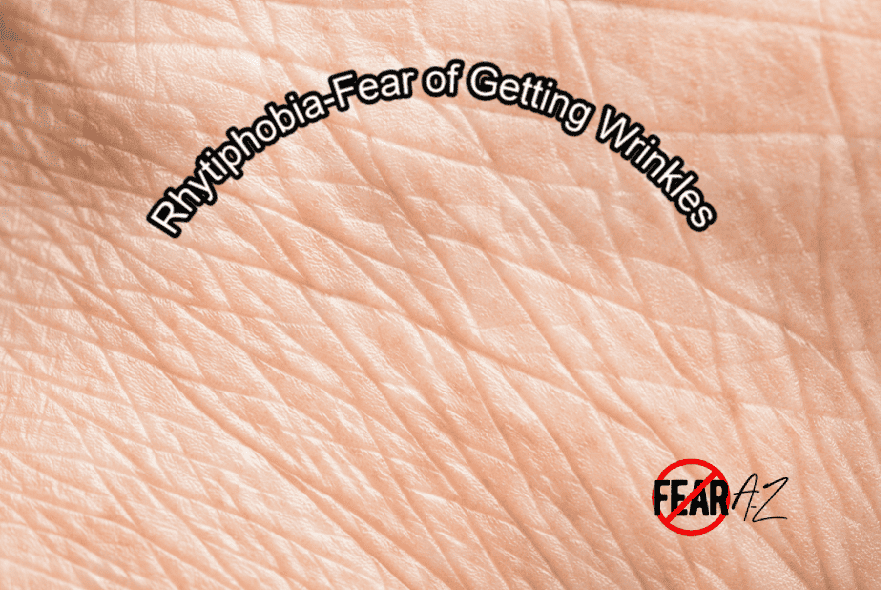Share This Article
The Fear of Wrinkles, or Rhytiphobia
With age comes wisdom, maturity, sore joints and wrinkles. But what if the very prospect of developing wrinkles makes your heart pound, causes your palms to sweat, and overcomes you with an illogical fear?
A deep-seated fear of wrinkles can come up because it is often linked to a fear of getting older. It’s not just ego; it’s about time, losing youth, and the changes that come with it. People who are afraid of this can go to great lengths with their skin care habits, cosmetic procedures, and even avoiding reality.
This excessive fear shows how much society covets the ability to stay young. We all want to look our best, but it’s important to find a balance between that desire and acceptance and love for the journey and wisdom that come with getting older.
Some people learn to accept that wrinkles are an inevitable aspect of aging but for people this is not the path and they can develop rhytiphobia, the idea is a significant source of fear, depression, and anxiety. If you’re dealing with rhytiphobia, knowing more about your condition is the first step to helping you manage it.

Why Rhytiphobia?
Rhytiphobia is the irrational fear of fine lines or wrinkles. Surprisingly, many share this wrinkle anxiety although there are those whose fears are more debilitating.
Many women proactively use moisturizers and other skincare products to manage and avoid the formation of wrinkles for as long as possible. But they understand and accept that it’s normal and part of getting old.
Unfortunately, some people go through a gamut of negative emotions at the very thought of having wrinkles or even if they see somebody else’s wrinkles. This is primarily caused by an irrational fear of having these lines on their faces. As a result, they take extensive measures to delay and get rid of these natural skin creases.
Some who suffer extreme cases of rhytiphobia harbor feelings of deep shame about themselves. They have poor self-confidence even if the development of wrinkles is normal.
Symptoms of Rhytiphobia
Like any phobia, the symptoms of rhytiphobia vary in extent and frequency. Some can manage to look at wrinkles and even talk about them despite a little discomfort. Those with more severe cases of rhytiphobia often manifest physical, mental, and emotional symptoms.
Here are the standard indicators and behaviors of someone with rhytiphobia:
- Physical symptoms that include one or several of these: excessive sweating, dry mouth, nausea, shallow breathing, headache, increased heart rate, and vomiting
- Extreme depression upon seeing a wrinkle, either on your body and face or on someone else
- Anxiety at the thought of having these skin creases
- Becoming anti-social because of what you assume people will think of you and your wrinkles
- Poor concentration because you are too fixated on your wrinkles
- Irritability with mood swings
- Obsession with various skin care products and trying them all without thought
- Excessive spending on different skin care treatments
Potential Causes of Rhytiphobia
The root cause of phobias, including rhytiphobia, is hard to determine, but like most of these irrational fears, it can be due to genetics, your environment, or perceptions.
Genetics
If your family has a history of other phobias like gerascophobia or the fear of getting old or any anxiety disorders or mental illnesses, you have a higher chance of developing wrinkle anxiety.
Environment
The trauma you experienced growing up can cause you to become fearful at the prospect of becoming unattractive. You’re afraid that having wrinkles will make you subject to bullying and criticism.
Perception
Your perception is another reason for developing rhytiphobia. Your mind is not open to the reality that changes in your skin and body will eventually happen. Additionally, you may be too caught up with the misleading and even pretentious social standards for beauty in older women.
Unfortunately, the way you think is a powerful force that can negatively impact you in several ways.
Rhytiphobia Treatment
There is no singular solution for getting rid of this fear. Each case should be managed based on its severity and how committed the person is to resolving their fears. The good news is there are several treatment options you can try. These can be done on their own or simultaneously as selected complementary therapies.
Self-Help Options
If you’re determined to take control of your wrinkle phobia, you can begin with a few self-help treatments.
Acknowledge Your Fear
This may be the hardest step of all, but continuing to deny your phobia and pretending that your reactions are normal won’t help. Admit that wrinkles are harmless and inevitable. Shifting your mindset to, There’s nothing to fear, is the first but most challenging step of all.
Consider starting a journal to document and express your thoughts and emotions as you learn to acknowledge rhytiphobia.
Learn about Wrinkles
Get to know your enemy to empower yourself and discover that there’s nothing to fear. Find out what causes wrinkles, learn the types of wrinkles, go to message boards and see what people think about their wrinkles, etc. Exposing yourself to wrinkles normalizes them and shows you that they’re perfectly acceptable to have.
Try Relaxation Techniques
Whenever you feel your fear rising, do breathing exercises, practice yoga, or meditate. Calm your mind and body, and let the anxiety slowly flow out of you.
Getting Professional Help
Your healthcare expert can answer your questions and provide you with a structured treatment plan that may include different forms of therapy such as:
- Cognitive behavioral therapy
- Exposure therapy
- Talk therapy
Your doctor may also decide to give you medications, such as beta blockers and sleeping pills.
Living with Rhytiphobia
A life lived in fear is no way to live, especially if you’re unnecessarily afraid of something. At a glance, rhytiphobia doesn’t seem like a major issue, but it can have several negative effects. Your fear of getting wrinkles can impact your self-confidence, make you feel ashamed or embarrassed, and even lead you to avoid others with wrinkles.
Make the decision to do something about rhytiphobia now. The sooner you start, the earlier you’ll get some relief.
Celebrate Your Wrinkles
Don’t let your fine lines rob you of the joy of getting old. Aging may not be portrayed in media as a positive or welcome change, but it holds an abundance of rewarding experiences. Many regard their wrinkles as signs of wisdom, maturity, and the emotions they’ve gone through. They are the survival lines of their journey.
With consistent effort, a strong will, and some patience, you can celebrate your wrinkles too. Age with grace and confidence.



